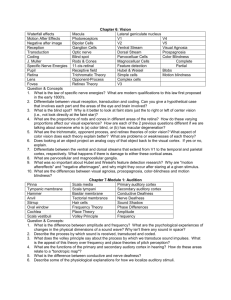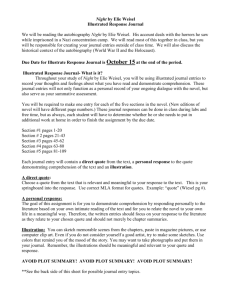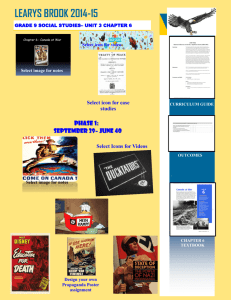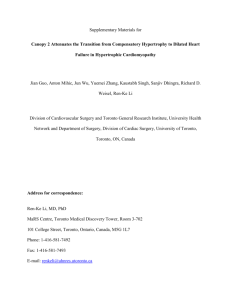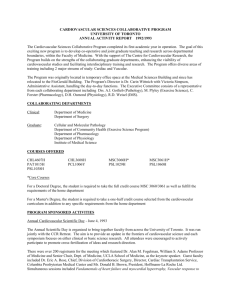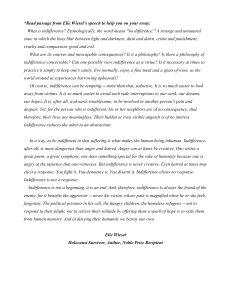Indifference has no Justification in the 21 Century: A Critical Analysis
advertisement
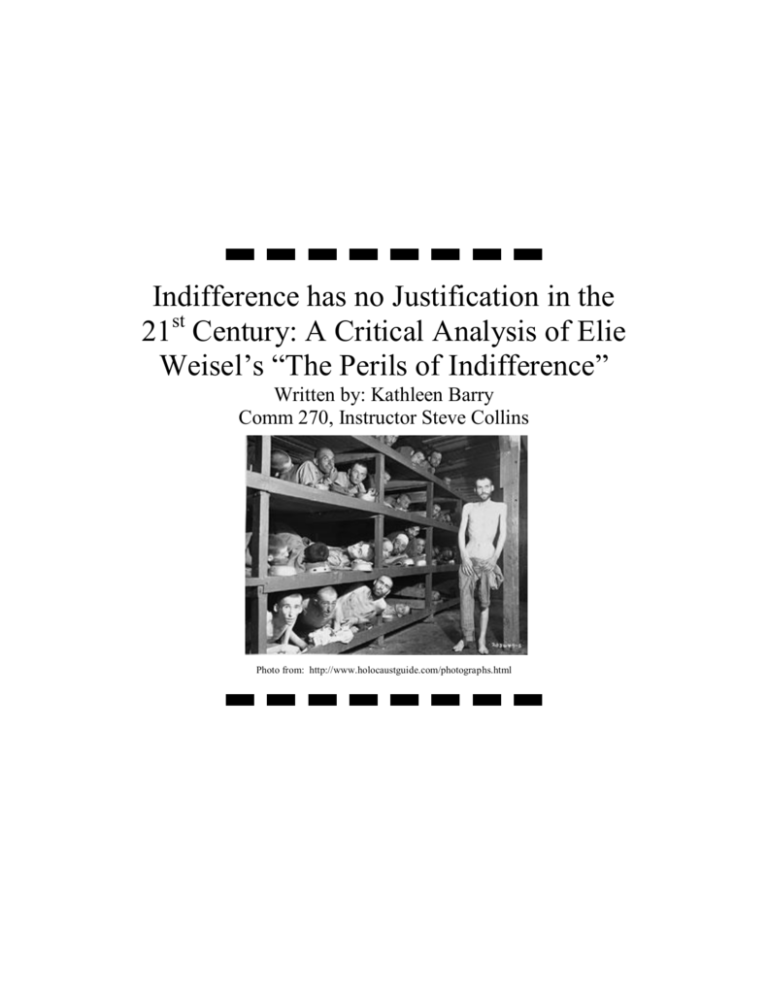
Indifference has no Justification in the 21st Century: A Critical Analysis of Elie Weisel‟s “The Perils of Indifference” Written by: Kathleen Barry Comm 270, Instructor Steve Collins Photo from: http://www.holocaustguide.com/photographs.html Abstract On April 22, 1999 Elie Weisel was a featured speaker of the Millennium Lecture Series at the White House. His speech was entitled “The Perils of Indifference” and he warns his audience about how dangerous indifference can be. This critical essay is comprised of several sections that discuss the rhetorical situation, justification of study, the narrative paradigm, and further critical analysis of his speech and is intended for any person interested in rhetorical studies. The in-depth critical analysis covers topics such as Weisel as the speaker, the use of questions throughout the speech, Aristotle‟s three forms of persuasion and the importance of the speech today. The overall goal of this critical essay is to demonstrate the significance that Weisel‟s argument still holds in current times, while still analyzing the weaker aspects of his speech. The Rhetorical Situation: A Sense of the Moment Elie Weisel gave the speech as a part of the Millennium Lecture Series on April 12, 1999, which was hosted by the then President Bill Clinton and his wife Hilary Rodham Clinton. The first lady gave the opening address that introduced Weisel, explaining why his speech would be so pertinent to the current issues of the day. She stated, It was more than a year ago that I asked Elie if he would be willing to participate in these Millennium Lectures...I never could have imagined that when the time finally came for him to stand in this spot and to reflect on the past century and the future to come, that we would be seeing children in Kosovo crowded into trains, separated from families, separated from their homes, robbed of their childhoods, their memories, their humanity. (Weisel n. pag.) The situation was eerily similar to what Weisel himself had gone through during WWII. Given the context of the speech, he was a very appropriate choice for the lecture series. He could educate listeners and shed light on the atrocities that were currently happening. Weisel had the power to make a difference and cause awareness about the conflict in Kosovo. When reading the speech with knowledge of the context, one realizes it is not only a reflection of the past, but a call to action for the present and the future. When Weisel talks about his experience of the Holocaust in the context of the war in Kosovo, he is responding to the rhetorical situation. The rhetorical situation is a theory developed by Lloyd Bitzer and it can be used to describe rhetorical texts, such as “The Perils of Indifference.” Bitzer claims that the “situation must somehow prescribe the response that fits” and that speakers fit available means to persuade in particular public contexts (Bitzer 10). In “The Perils of Indifference,” Weisel uses the Holocaust (available means) because it a topic he knows very well to persuade in particular public contexts (the audience on his speech to beware of indifference in the modern context). There are three elements of the rhetorical situation- exigence, audience, and constraints (Bitzer 6). In the circumstances of this speech at the time it was given, there could be two exigencies here. The Millennium Lecture Series is the exigence of why Weisel is asked to speak. If it were not for this occasion, Weisel would not have a venue or the invitation to speak. The other exigence is the war in Kosovo, which gives Weisel the material and topic for his speech. This conflict on the other side of the world gives the inspiration to Weisel‟s words and overall message. The audience is those who listen to the lectures- the American public. Many people were in attendance of the speech, but it was also televised and has been reproduced in many locations, such as the America Rhetoric website. There are several possible constraints in this situation. One constraint is Elie Weisel‟s own knowledge and experiences. He cannot speak outside of what he knows and how it can apply to the message that he is trying to deliver. Furthermore, the rhetoric must target Americans and not all of them will have access to the lectures. Weisel may want his speech to be heard internationally, but he cannot be sure of how far it will spread. In the beginning of the speech Weisel specifically addresses, “Mr. President, Mrs. Clinton, members of Congress, Ambassador Holbrooke, Excellencies, friends,” (Weisel n. pag.) demonstrating who some of the audiences members present at the time of the speech were. Finally, the rhetoric must be an appropriate call to action- it cannot offend anyone, but it must still be influential. Since the Kosovo conflict was a highly debated topic, as was whether or not NATO should intervene, Weisel must be careful in how he chooses to present the situation. However, Weisel also cites events other than Kosovo and the Holocaust in his speech. When Weisel expresses his gratitude in the beginning of the speech it is for more than his liberation from the Holocaust. It is for injustices all over the world that the United States tries to improve. While Weisel talks about indifference in broad terms, he means it specifically. By knowing of the war crimes and casualties in Kosovo, Weisel speaks in these broad terms hoping that the audience will make the connection between the past, the Holocaust, and the present, Kosovo. Yet Weisel still cites other horrific events such as assassinations of famous people including Kennedy, Martin Luther King Jr., and Gandhi, not to mention the “bloodbaths in Cambodia and Algeria, India and Pakistan, Ireland and Rwanda, Eritrea and Ethiopia, Sarajevo and Kosovo; the inhumanity in the gulag and the tragedy of Hiroshima. And, on a different level, of course, Auschwitz and Treblinka” (Weisel n. pag.) He speaks more in-depth of the atrocities of the Holocaust and that indifference is a sin. After eliciting such strong emotions about the past from the audience, Weisel begins his closing strongly by referencing the situation in Kosovo, The joint decision of the United States and NATO to intervene in Kosovo and save those victims, those refugees, those who were uprooted by a man, whom I believe that because of his crimes, should be charged with crimes against humanity. But this time, the world was not silent. This time, we do respond. This time, we intervene. (Weisel n. pag.) In Bitzer‟s theory of the rhetorical situation, there are situational life cycles where rhetorical situations “come into existence, then either mature or decay or mature and persist.” (Bitzer 12). In Elie Weisel‟s speech “The Perils of Indifference,” this rhetorical situation matures and persists because Weisel relates the past to a current situation. He allows the situation to mature through his warnings of indifference and it persists because his argument fits in the current context of the war in Kosovo. His use of other examples also matures the situation because he strongly backs up his ideas with elaboration. When reading this speech in the historical context, it becomes clear that Elie‟s concerns about indifference are not merely a reflection of the past, but a reminder that atrocities still happen today and that all people are responsible for ending them. Indifference can no longer be an excuse. One concept that Weisel really highlights is that it is the turn of the century and that a new millennium is beginning. He hopes that the new millennium will bring better treatment of all humans than the past. We are on the threshold of a new century, a new millennium. What will the legacy of this vanishing century be? How will it be remembered in the new millennium? Surely it will be judged, and judged severely, in both moral and metaphysical terms. These failures have cast a dark shadow over humanity: two World Wars, countless civil wars, the senseless chain of assassinations …bloodbaths... So much violence; so much indifference. (Weisel n. pag.) By pointing out the injustices that occurred in the previous century, Weisel hopes it will spark motivation to improve the present and work toward the future. Weisel challenges his audience to reflect on the previous century in hopes of progress for future generations. Justification of Study Out of all the speeches given in the United States, Elie Weisel‟s “The Perils of Indifference” is one of the top 100, according to American Rhetoric (Weisel n. pag.) Weisel is included among other famous and sensational speakers such as Martin Luther King Jr., Franklin D. Roosevelt, and Ronald Reagan. This alone shows that speech is an important and strong piece of rhetoric in American history. Although Weisel speaks of the past by telling of his experience in the Holocaust, the speech is still important today because it reminds the world that indifference is a dangerous thing. Weisel teaches us that we cannot allow history to repeat itself again and that action must be taken to prevent atrocities from happening. At the time the speech was given, Weisel spoke in context of the Kosovo conflict because he felt that indifference would make the situation even worse. His words rang true at that time, but his speech can still continue to make an impact today. Currently, the genocide in Darfur is an issue that many people are fighting to stop. In this context, Weisel‟s speech can apply because the people of Darfur need help and indifference will do nothing to aid their plight. Also, this situation is similar to the Holocaust because what was happening in Darfur went unknown for a long time before people found out about it (www.savedarfur.org.) During WWII, the atrocities being committed by Adolph Hitler were not fully known until the war ended and American troops were able to liberate the concentration camps. This speech is worthy of study today because Weisel‟s words can still made an impact on our society. His argument is important because in order for our world to be a better place, people cannot continue to turn their head to problems simply because they take place on the other side of the world. All humans need to help each other and work together, without discrimination or indifference being an issue. Critical Perspective: The Narrative Paradigm “The Perils of Indifference” was given by the famous author of the novel Night and Holocaust survivor, Elie Weisel. The speech was given during the Millennium speaker series while Bill Clinton was in his second office term as president. The context of this speech is important because it occurs at the time of the Kosovo conflict in the Middle East. When reading or listening to the speech, Elie Weisel recounts some of the hardships of the Holocaust, a tragedy he experienced in his life. Studying this speech as a piece of rhetoric, one critical concept that can be applied is Walter Fisher‟s, the narrative paradigm. It is an appropriate and fitting perspective to use in critiquing this particular speech because Weisel tells his own story in the context of the Kosovo conflict, hoping to open the eyes of American people so that history would not repeat itself. Walter Fisher was the first person to develop the analytical approach of the narrative paradigm (Stoner and Perkins 185.) Fisher‟s main argument is that humans naturally use storytelling as a part of their rhetoric. He believes that in everyday life, people use both logic and poetic to persuade and that rhetorical analysis should also reflect this idea. There are several elements to consider when using the narrative paradigm to analyze a piece of rhetoric including narrator, character, plot, and setting. When analyzing, it is important to remember that all these elements are interconnected (Stoner and Perkins 186.) A narrator can be a character in the story or merely an observer of events (Stoner and Perkins 187.) In “The Perils of Indifference,” Elie Weisel is the narrator, telling about his experience in the Holocaust. The first paragraph of his speech he tells the story of a young boy liberated by the American troops, but still not free in his heart. This young boy that Weisel speaks of is himself, also making him the main character of his rhetoric. In the narrative paradigm, characters are the people in the story or things that function like people in the story. In many pieces of rhetoric, the narrator and the character can be the same person (Stoner and Perkins 187.) Other key characters that Weisel mentions are the American troops, the Jews held captive in WWII, the Nazis, and victims of indifference. Another element to consider is plot, which is essential for any story to be effective. Plot is the underlying structure or pattern of actions and casualty in the narrative (Stoner and Perkins 187.) In the context of this speech, the plot is the events that Weisel talks about in his speech. Weisel, however, does not tell his narrative in chronological order but instead weaves his story through the past and the present. He tells of past events but also remarks on current issues, while inserting his own opinion on both. His speech works well not following chronological order because it still makes sense without being concrete. Narrator, character, and plot occur within a certain time and place, also known as setting or context which is another element of the narrative paradigm. The setting is the combination of all the parts of the story outside of the characters (Stoner and Perkins 187.) In Weisel‟s speech, the setting is the White House where he is part of the Millennium Speaker Series. His larger audience would be the nation, and even the world, because he wants everyone to see his story in the context of the Kosovo conflict. “The Perils of Indifference” can be analyzed as a narrative piece of rhetoric because Elie Weisel recounts his own story to others. He uses all of the necessary elements to create a story that is not chronological, but also appropriate for its goal. Pieces of rhetoric seek to influence and that is just what Weisel is trying to do- his speech is a call to action to not be indifferent about the problems in the world. He uses his story of the Holocaust to show how dangerous indifference can truly be. By using himself as the narrator and as a character, Weisel makes his narrative personal and more influential. This story could be told with such an impact unless the narrator experienced it firsthand, hence why Weisel is both the perfect narrator and character. The plot and the setting both also greatly contribute the impact of the narrative which has a perfect balance of past and present. However, there are two other concepts within the narrative paradigm to consider when analyzing a particular piece of rhetoric. When using the narrative paradigm to critique a piece of rhetoric, the text needs to be examined as a rationale for action. There are two main concepts to consider, narrative probability and narrative fidelity, both developed by Walter Fisher. Narrative probability deals with the coherence of the rhetoric and asks two important questions- does the story hang together and is the plot free of contradictions? It “refers to formal features of a story conceived as a discrete sequence of thought and/or action in life or literature (any recorded or written form of discourse)” (Stoner and Perkins 190-191.) The narrative fidelity concept has to do with correspondence and logic of the argument. It concerns the „truth qualities‟ of the story, the degree to which it accords with the logic of good reasons: the soundness of its reasoning and the value of its values.” (Stoner and Perkins 191.) Unfortunately, these concepts can be problematic and ambiguous to use. There are important questions to ask when using these two concepts. The narrative probability asks if the story hangs together and if the plot of free of contradictions. Here, the entire message of the rhetoric needs to be considered. In “The Perils of Indifference,” Weisel‟s argument is put together effectively and the message as a whole is clear. There is rationale of events in the speech because everything ties together into a cohesive argument. Although the story is not told in a chronological order like some stories, every event is connected to each other because they all support the argument that indifference is dangerous and wrong. Stoner and Perkins say “the more logical the relationship between plot events, the more powerful the story” (191) and this can be seen in Weisel‟s narrative. His story is so effective because the elements of the plot are logical and interrelated. The narrative fidelity, on the other hand, is more complicated and thus, more difficult to apply to this speech. The first step in this process is to determine what the argument is- both the claim and its support- and then evaluate the quality of the argument (Stoner and Perkins 192.) Weisel‟s argument is that indifference is immoral and he supports it with his own experience in the Holocaust as well as other injustices that have happened throughout the world. As stated by Ronald Carpenter, one of the first to actively employ critical narrative analysis, “Rhetorical interaction between discourse and corroborating events is integral to attaining narrative fidelity” (Carpenter 2.) Therefore, Weisel bringing in outside examples of injustice are necessary to justify his position. This argument reflects good values, and thus fulfills narrative fidelity‟s criteria of the logic of good reasons. Weisel‟s examples have relevance to his topic and he is consistent in his argument because narrative fidelity should be achieved through real events. Weisel „s narration in “The Perils of Indifference” is an integral component of his argument. By utilizing the narrative paradigm, outlined by Walter Fisher, to analyze this speech, it becomes clear that Weisel‟s argument is both consistent and logical. The plot of the story is clear, although not sequential, and the message is unified. Weisel uses logic of good reasons, having based his argument on strong values. Fisher proclaims, “narration can interpreted and assessed as modes of expressing good reasons, as narrative forms inducing conclusions about people, community, and the world (Fisher 1.) This quote accurately depicts narration because it is supposed to use sounds reasoning to tell a story that causes the audience to make a decision about whether or not the rhetor makes a valid argument. Weisel fulfills all the criteria for a successful piece of rhetoric being critiqued through Fisher‟s narrative paradigm. To wrap up this section of the critique, Weisel should be seen as telling a story to combat all the indifference in the world. His story reaches out to people to change their views and make a difference in the lives of others. Stories are an important part of human nature, as every person seeks to tell their own story. So to conclude in the words of Walter Fisher, “If the narrative paradigm celebrates anything, it celebrates human beings, and it does this by reaffirming their nature as storytellers” (Fisher 2.) Critical Analysis: Delving Further into Weisel’s Rhetorical Choices As discussed in previous sections, the rhetorical situation is a very important aspect of Elie Weisel‟s speech, “The Perils of Indifference.” The rhetorical situation is one reason why this speech has had such an impact. The speech was also analyzed through an important rhetorical concept, the narrative paradigm which was developed by Walter Fisher in the 1980s. While both these analyses of the speech are helpful, there are many other factors to critique about Weisel‟s motivational speech. For instance, it is imperative to elaborate on why Weisel is an appropriate speaker, Weisel‟s use of the question, the forms of persuasion that Weisel chooses to employ, and why this speech is still important today and will continue to be a learning tool in the future. All of these ideas will be discussed in further detail throughout this section. Weisel as Speaker Had this speech been given by any other speaker than Elie Weisel, it would not have the profound impact that it does. As it has already been discussed, Weisel is the perfect narrator for this speech because he can connect his personal history to the current context of the Kosovo conflict. He is also a famous and gifted writer with his novel, Night, that is also about his experiences in WWII and the Holocaust. This novel is required reading for many students middle school and high school aged, as it is a short and dynamic firsthand account of the Holocaust. Not many people could give the insight that Weisel brings to his speech. However after listening to the speech, one realizes that Weisel is a better writer than he is an orator. When speaking, Weisel has a very think accent and he speaks quite slowly. Furthermore, his voice is monotone and without great inflection. Not a very articulate speaker, the lack of intonation in Weisel‟s voice creates a boring and drone oral presentation. Due to these factors, the speech actually makes a greater impact when read than when spoken because Weisel is hard to understand. He does not have an engaging voice like other famous speakers such as Martin Luther King Jr., but this could be due to the fact that English is not his first language. One can imagine how difficult it would be to present a speech that is not in your native language. Weisel‟s words still hold a lot of meaning and his argument is valid, but the written version is more influential than the oral one. Not to mention, there are clues that some of Weisel‟s speech was improvised and not written beforehand. For example, after Hilary Clinton‟s kind introduction, Weisel acknowledges her words, “and I am grateful to you, Hillary, or Mrs. Clinton, for what you said, and for what you are doing for children in the world, for the homeless, for the victims of injustice, the victims of destiny and society.” (Weisel n. pag.) This shows the audience that Weisel‟s speech was not completely written and memorized, but that he can speak without preparation also. Weisel is a very intelligent man, which can be seen through the words of his speech, but his arguments are better presented in a written discourse. Use of the Question In his speech, Weisel really challenges the audience to think about the ideas that he presents. One method Weisel employs to encourage the reflection of his listeners is his use of the question. Through the 20 minute and 48 second speech minute speech, Weisel asks numerous questions (Weisel n. pag.) Some whole paragraphs in the speech are merely questions, an interesting syntactical approach taken by Weisel. This technique is quite unique but is appropriate for Weisel‟s goal- he wants to make the public contemplate about the wrongdoings that are taking place in the world. For example, Weisel asks his audience questions such as, “Is there a philosophy of indifference conceivable? Can one possibly view indifference as a virtue? Is it necessary at times to practice it simply to keep one's sanity, live normally, enjoy a fine meal and a glass of wine, as the world around us experiences harrowing upheavals?” (Weisel n. pag.) These questions can really have an effect on the audience because it makes them question their own behavior and beliefs. After reading or hearing this speech, someone might feel guilty about their fine meal and glass of wine and this could lead to them contributing to change in the world. Weisel asks questions that make it hard for the audience to sit back and not take action. By asking his audience to respond to these tough inquiries, Weisel can inspire other people to make a difference in the lives of those suffering. These questions are an essential part of this speech being a call to action. Sometimes in the speech, Weisel answers his own questions. For instance, “What is indifference? Etymologically, the word means „no difference.‟ A strange and unnatural state in which the lines blur between light and darkness, dusk and dawn, crime and punishment, cruelty and compassion, good and evil” (Weisel n. pag.) Weisel replies with answers to what his audience might not already know so that both the question and the answer have a lasting effect. For the most part however, he asks opinion questions or questions that cannot be answered. Take for example this question, “Why the indifference, on the highest level, to the suffering of the victims? (Weisel n. pag.) Weisel does not expect his listeners to answer this question, because it is quite complicated to understand why indifference only hurts the victims of the injustice. He asks this because Weisel wants people to realize that their indifference affects other people and one cannot look away from atrocities. But why does Weisel use so many questions? The response is because in this speech, the questions are effective and they hold the speech together. As discussed in the next section, they are used as two of Aristotle‟s three forms of persuasion- pathos and ethos. Aristotle’s Forms of Persuasions Aristotle was the author of the first major treatise of rhetoric- so it would be quite appropriate to use his ideas in the critical analysis of a rhetorical piece. This may seem ironic because he was Plato‟s student, who thought that rhetoric was “mere cookery” (Stoner and Perkins 1-2.) Aristotle defined rhetoric as an ability in each particular case to seek or discover the available means of persuasion (Stoner and Perkins 2.) Rhetoric is an art or a technique in this definition and it takes place in the moment. In respect to “The Perils of Indifference,” Weisel uses the narrative paradigm as his available means of persuasion and in his particular case, Weisel seeks to tell his story in the context of the Kosovo conflict. Although Aristotle‟s definition is important, it is his ideas about three forms of persuasion that will be essential in analyzing this speech. According to Aristotle, the three forms of persuasion are logos, pathos and ethos. Logos means logical and it appeals to reason (Stoner and Perkins 151-152.) Weisel uses this form of persuasion to attract audiences that like facts and rational arguments. For example, Weisel shares the story of a cargo of Jews not being allowed into the United States and was sent back to Europe, “The depressing tale of St. Louis is case in point. Sixty years ago, its human cargo -- nearly 1,000 Jews -- was turned back to Nazi Germany. And that happened after the Kristallnacht, after the first state sponsored program, with hundreds of Jewish shops destroyed, synagogues burned, thousands of people put in concentration camps. And that ship, which was already in the shores of the United States, was sent back” (Weisel n. pag.) Here Weisel uses a fact, with numbers and evidence, to demonstrate the indifference that took place by the United States during WWII. However, in Weisel‟s argument, logos is not the only form of persuasion used. Ethos is another one of Aristotle‟s ideas and it refers to the believability or the credibility of character (Stoner and Perkins 148-149.) When making a decision about an argument, an important aspect of that decision is whether or not the speaker is appropriate for the topic. In this situation, as previously discussed, Weisel is the perfect speaker. He has experienced indifference firsthand and can relate it to current problems in the world to affect an audience. An example of this would be the beginning and ending of the speech. Weisel opens and closes with his childhood experience of the Holocaust, thus making him a credible narrator for this piece of rhetoric. For instance, his closing shows the audience why he is a relevant speaker, “And so, once again, I think of the young Jewish boy from the Carpathian Mountains. He has accompanied the old man I have become throughout these years of quest and struggle. And together we walk towards the new millennium, carried by profound fear and extraordinary hope” (Weisl n. pag.) The last of Aristotle‟s three forms of persuasion is pathos. Pathos literally means pathetic and it deals with emotional appeals of the rhetor to their audience. Aristotle recognizes that human passions are powerful motivators and that logic can prove an argument, but sometimes emotions are necessary to actually get people to respond to the argument in the way in which the rhetor intends (Stoner and Perkins 149-150.) Weisel‟s argument is an emotional one because his narration is so personal to his own history. He tries to illicit sympathy from his audience because he wants to make them care about the issue as much as he does. His personal examples and his references to the atrocities of the Holocaust are methods in which he uses emotional persuasion. Importance Today The 20th century has been the century with the greatest amount of change in the history of the world. Consider how different the year 1900 was from the year 2000. So much technological advancement took place in the past century and globalization continues to spread rapidly. Weisel suffered atrocities during the Holocaust by the hands of the Nazis but he also suffered from indifference from countries all over the world who did not step in to help his people until after WWII was over. While governments may have had knowledge of the mass genocide taking place, the average citizen had no idea about the inhumanity taking place on the other side of the world. Even some in Europe didn‟t know the details of what was happening in their own backyard. WWII took place before television was found in every home. The population depended on newspapers and the radio to receive their information. Today, we have innumerable communication options varying from the internet to satellites in space. The current situation is completely different from WWII and indifference can no longer be an excuse. It is important to analyze this idea with an understanding of how modern technology has developed. The modern era of mass media and communication began when the steam-powered printing press was invented in 1830, which started a revolution of communications. Now newspapers could come out daily and the spread of information quickened. By 1870, the newspaper industry was a booming business (Hoffman 177-178.) While this technology was around during the Holocaust, the advent of modern television, one of the most transforming events in history, came afterwards. In 1968, the United States launched the first ever television satellite into space (Hoffman 178.) This was a huge change because now information could be transmitted from anywhere and events that took place on the other side of the world could be broadcast in the average person‟s living room. People now knew more international and governmental information. This is important because then, if people are unhappy with what they see on the television, they are more likely to urge the government to take action, or possibly even take action themselves. Weisel‟s urging to his audience to not be indifferent is so important in the current century because indifference should no longer be an issue. People have access to so much information through new technology that whenever an injustice is discovered, information can be widely disseminated and industrialized countries have the resources to aid those situations. Not to mention, 24hour news channels like CNN and the invention of the internet in the 1980s. People can receive news when it happens and do not have to wait for the evening news. The world that we live in today is a completely different place than the world that Elie Weisel grew up in. During the Holocaust he was stuck in a concentration camp with no control over his lifenow he is a famous author and an important historical figure. When he was sitting in the barracks at Auschwitz, he never imagined he would later be a decorated speaker at the Millennium Lecture Series in the White House. Modern technology gives us so many new opportunities, one of them being the opportunity to make a difference in the world. People now have the information and the resources to end the suffering of humans around the globe. Weisel‟s argument is so important today because now we have the communication and the ability to make changes all over the world- indifference has no justification in the 21th century. Final Summary About a year before the Millennium Lecture Series, Hilary Rodam Clinton asked Elie Weisel to give a speech at the event in Washington, D.C. Little did either of them realize, the events of the Kosovo conflict would surface, creating an exigence upon which Weisel‟s piece of rhetoric “The Perils of Indifference” would be built. The rhetorical situation surrounding the speech is imperative to understanding why Weisel is an appropriate speaker and why his argument was valid at the time it was given. This critical essay examines the rhetorical situation, mainly focusing on the Kosovo conflict, but also briefly elaborating on other injustices mentioned in the speech. Analyzing the speech through the rhetorical situation is a critical component to understanding the speech as a whole. Furthermore, the narrative paradigm, created by Walter Fisher, is applied to the speech using the elements of plot, character, and narrator while also interpreting the speech through the concepts of narrative probability and narrative fidelity. Through this analysis it was determined that Weisel‟s “The Perils of Indifference” was a successful piece of rhetoric as it told a story that was able to influence an audience through sufficient support. Both narrative probability and narrative fidelity were fulfilled and the notion that all humans have a natural inclination to tell stories was discussed. Interesting articles that utilized the narrative paradigm and explained the concept more in depth were cited for additional understanding of the topic. The justification of study and critical analysis highlights why Weisel‟s speech is still important today. Weisel‟s speech was influential when given in 1999, but this critical essay seeks to examine why Weisel‟s message still has significance in today‟s society, nearly ten years after the speech‟s original presentation. The most essential section of the detailed critical analysis is the importance in the 21st century, which features information about the convergence of media. New technologies have created a greater dissemination of information and a greater access to resources throughout the world. Advancements such as these contribute to globalization and support the argument that injustice has no justification in the 21st century. After reading this essay, further discussion and potential research topics for the future may arise. This critique only skims the surface of the complex topics such as the rhetorical situation and the narrative paradigm. The rhetorical situation could be studied more in-depth and go beyond the conflict in Kosovo. Research could be done into why Hilary Clinton asked Weisel to be a speaker in the first place. Furthermore, by concentrating on only one concept from the narrative paradigm, this discussion could be further elaborated upon (versus the discussion of two concepts here, resulting in a less comprehensive examination.) The detailed critical analysis opens many windows to new research as each topic in this section is only briefly discussed. More research could be done in the area of Weisel‟s life and on the development of communications, both interesting topics that could lead to unique discussion and rhetorical critique. Bibliography Weisel, Elie. “The Perils of Indifference.” The History Place: Great Speeches Collection. 1 March 2008. http://www.historyplace.com/speeches/wiesel.htm Bitzer, Lloyd F. “The Rhetorical Situation.” Philosophy and Rhetoric 1 (1968): 1-14. History of the War in Kosovo. Apr. 1999. Center for Balkan Development. 1 March 2008. http://www.friendsofbosnia.org/edu_kos.html Stoner, Mark and Sally Perkins. Making Sense of Messages: A Critical Apprenticeship in Rhetorical Criticism. Boston: Houghton Mifflin, 2005. Hoffman, Bruce. Inside Terrorism. New York : Columbia University Press, 2006. Carpenter, Ronald H. "Admiral Mahan, 'Narrative Fidelity,' and the Japanese Attack on Pearl Harbor." Quarterly Journal of Speech 72.3 (1986): 290-305. Fisher, Walter R. "Clarifying the Narrative Paradigm." Communication Monographs 56.1 (1989): 55-59 Save Darfur. 2007. Save Darfur. www.google.com. 18 Apr. 2008 <http://www.savedarfur.org/newsroom/policy/>. Crispin, M G. Holocaust . www.google.com. 18 Apr. 2008 < http://www.holocaustguide.com/photographs.html>. Weisel, Elie. "The Perils of Indifference." American Rhetoric: Top 100 Speeches. 2001. American Rhetoric. 18 Apr. 2008 <http://www.americanrhetoric.com/speeches/ewieselperilsofindifference.html>.

